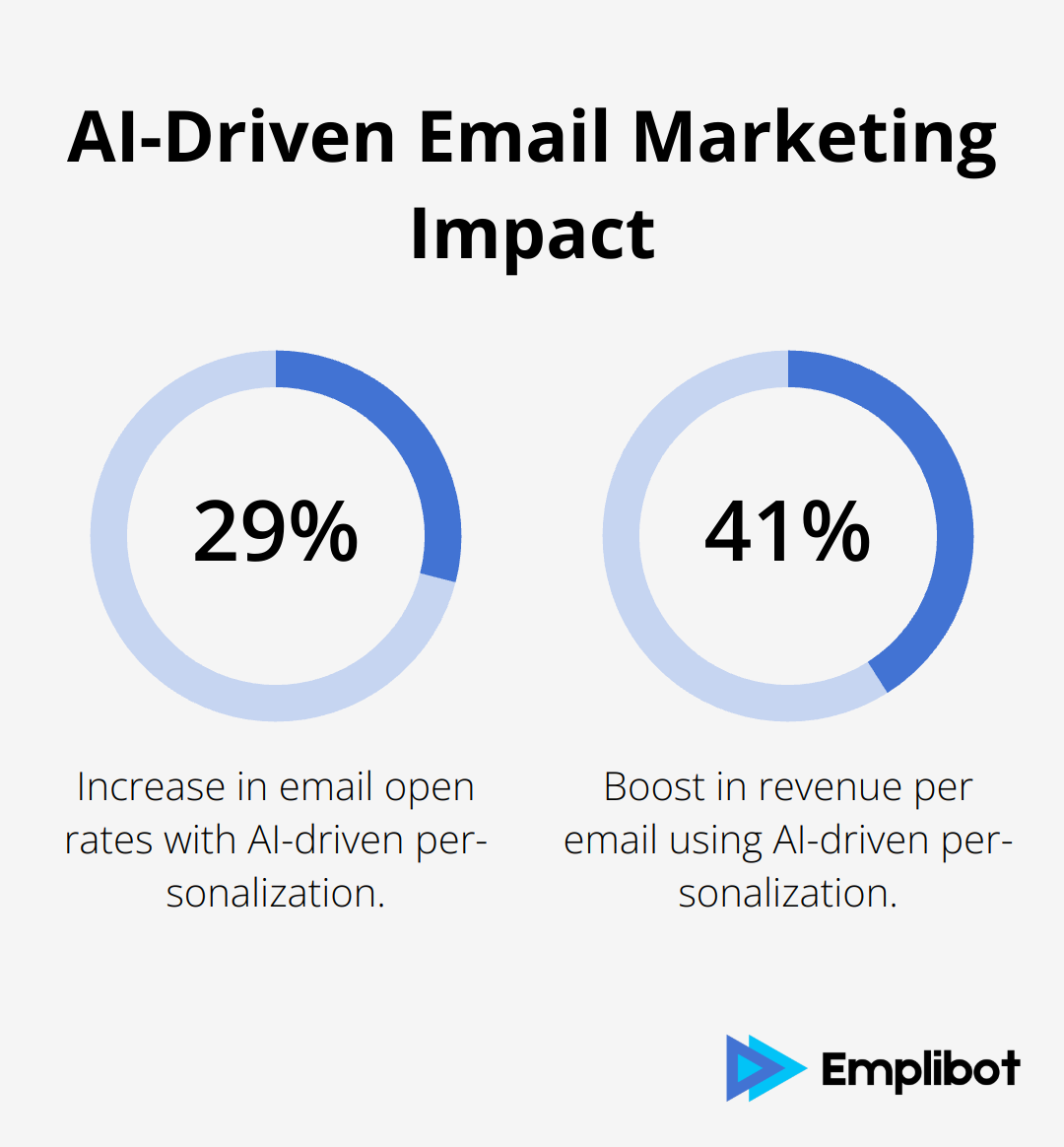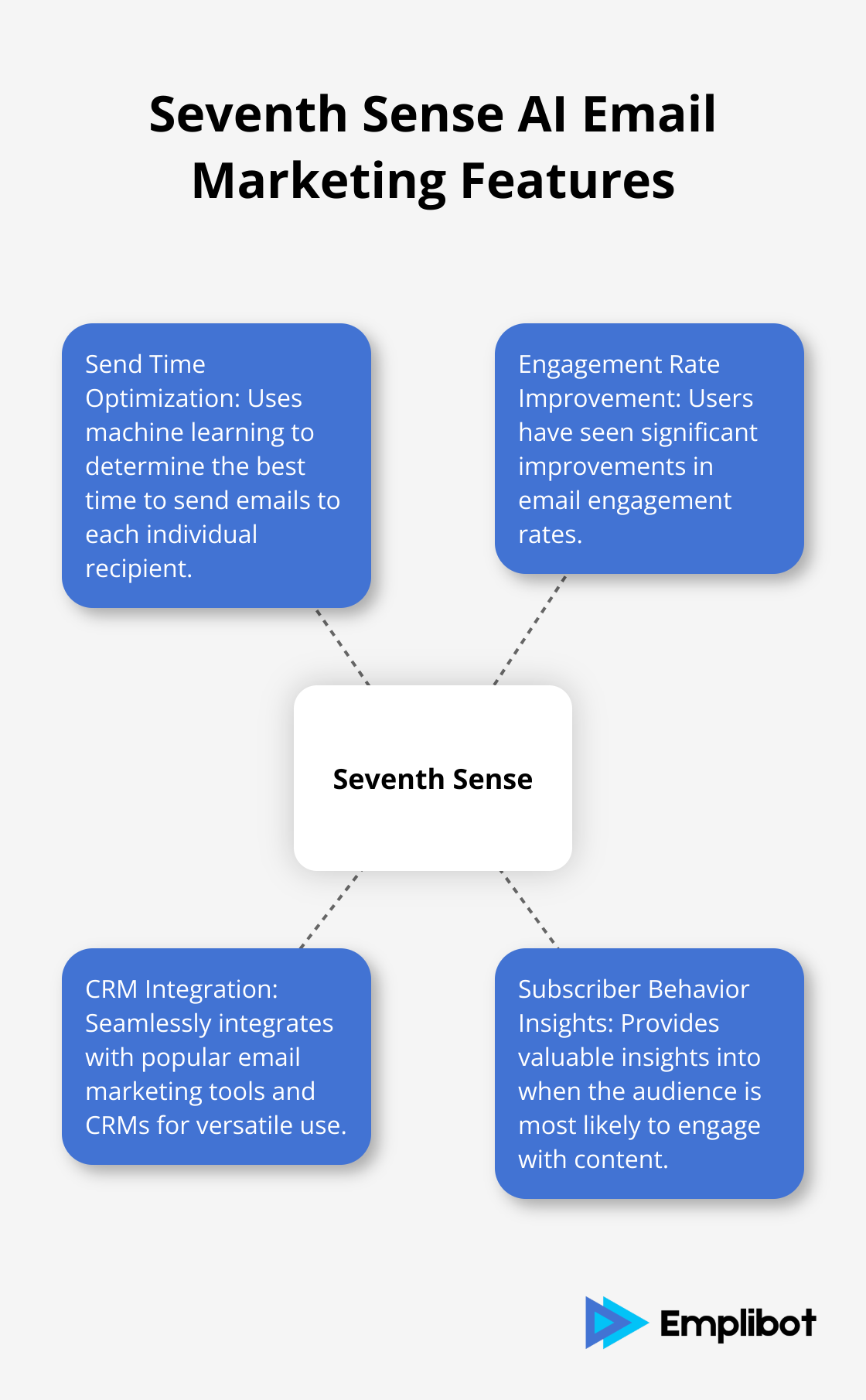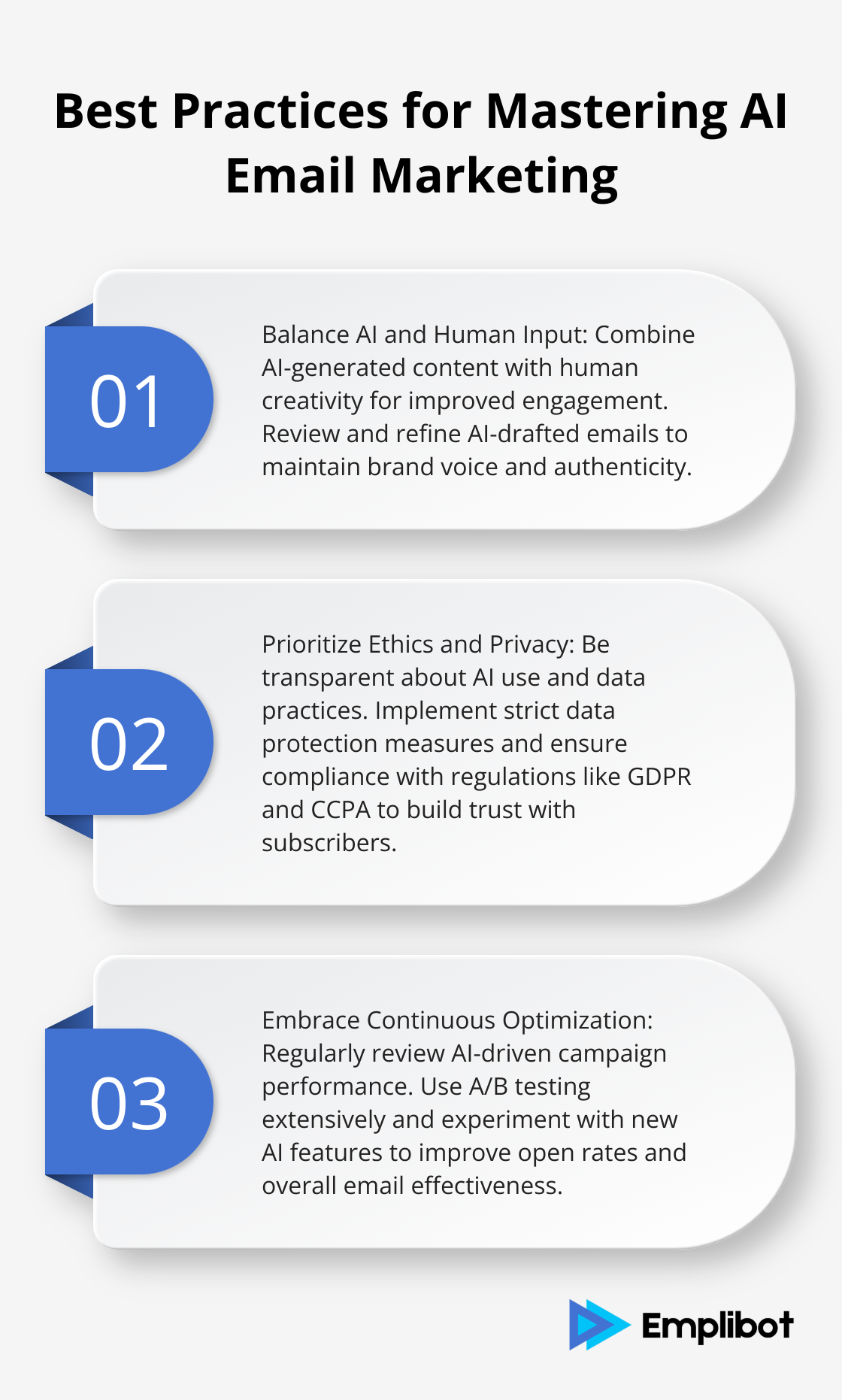AI email marketing tools are revolutionizing how businesses connect with their audience. These powerful solutions leverage advanced algorithms to create highly personalized campaigns that resonate with recipients.
At Emplibot, we’ve seen firsthand how AI-driven email marketing can significantly boost open rates, click-throughs, and conversions. In this post, we’ll explore the top AI email marketing tools of 2025 and share best practices for implementing them in your strategy.
How AI Transforms Email Marketing
AI revolutionizes email marketing, making it more effective and efficient than ever before. The digital landscape has witnessed a significant shift in how businesses approach their email campaigns, leveraging AI to create highly targeted and personalized content.
Hyper-Personalization at Scale
AI-powered email marketing tools analyze vast amounts of customer data to create highly personalized emails. These tools exceed simple name insertion, tailoring content, product recommendations, and even send times to individual preferences. A study by Epsilon found that personalized emails generate 6 times higher transaction rates compared to generic messages.
Implementing AI-driven personalization in email marketing has been shown to increase open rates by 29% and revenue per email by 41%. This level of personalization was previously impossible to achieve at scale without AI.

Boosting Engagement Metrics
AI tools dramatically improve email open rates and click-through rates. These tools predict the best time to send emails to each recipient by analyzing historical data and user behavior, optimizing for engagement.
A report by Adobe revealed that AI-driven email marketing results in a 13% boost in click-through rates. Moreover, emails with AI-generated subject lines see an open rate increase of 5% to 10% (as noted by Team GPT).
Automating for Efficiency
Time-saving automation stands out as a key benefit of AI in email marketing. These tools handle tasks like list segmentation, content creation, and campaign optimization automatically, freeing up marketers to focus on strategy and creativity.
According to recent surveys, almost half of marketers (around 47%) already use AI tools to generate content, and an astounding 90% of content marketers use AI in some capacity. This adoption has led to significant time savings, with some reports suggesting AI can save marketers up to 30% of their time by automating email design, content creation, and scheduling.
The Future of Email Marketing
AI email marketing tools are not just a trend; they’re becoming essential for businesses looking to stay competitive in the digital landscape. Companies can create more engaging, personalized, and effective email campaigns while saving time and resources through AI’s power.
As we move forward, the integration of AI in email marketing will only deepen. The next section will explore the top AI email marketing tools of 2025, showcasing how these advanced solutions are shaping the future of digital communication.
Top AI Email Marketing Tools for 2025
Brevo: Comprehensive AI-Driven Marketing
Brevo emerges as a powerhouse in AI email marketing. Its AI-powered content generator creates compelling email copy, subject lines, and personalized product recommendations. Brevo’s predictive send-time optimization ensures emails reach recipients at peak engagement times.
A standout feature is Brevo’s advanced segmentation capabilities. It analyzes customer behavior across multiple touchpoints, creating hyper-targeted segments that boost conversion rates.
Brevo excels in e-commerce integrations, making it a top choice for online retailers. Its AI-driven abandoned cart recovery emails have demonstrated impressive recovery rates.
ActiveCampaign: Predictive Sending and Automation
ActiveCampaign’s strength lies in its predictive sending feature and robust automation capabilities. The platform’s AI analyzes each subscriber’s past behavior to determine the optimal time to send emails, resulting in improved engagement rates.
One of ActiveCampaign’s most powerful features is its machine learning-powered lead scoring. This tool automatically identifies the most valuable leads, allowing sales teams to focus their efforts more effectively.
ActiveCampaign’s automation builder is intuitive yet powerful, allowing marketers to create complex, multi-step campaigns with ease. Its AI suggests optimization opportunities based on campaign performance, continuously improving results over time.
Seventh Sense: AI-Powered Send Time Optimization
Seventh Sense specializes in send time optimization, using machine learning to determine the best time to send emails to each individual recipient. This level of personalization has led to significant improvements in email performance metrics.
Seventh Sense reports that their users have seen improvements in engagement rates. The platform integrates seamlessly with popular email marketing tools and CRMs, making it a versatile addition to existing marketing stacks.
Seventh Sense’s AI also provides valuable insights into subscriber behavior, helping marketers understand when their audience is most likely to engage with content. This information can inform not just email strategies, but broader marketing efforts as well.

Emplibot: Beyond Email Marketing
While the aforementioned tools offer impressive capabilities, Emplibot provides a comprehensive solution that extends beyond email marketing. Emplibot automates your entire content marketing strategy (from blog posts to social media), ensuring a cohesive and effective online presence across all channels.
As we look towards 2025 and beyond, these AI-powered tools will continue to evolve, offering even more sophisticated features. The next section will explore best practices for leveraging these tools effectively in your email marketing strategy.
How to Master AI Email Marketing

Strike the Right Balance
AI email marketing tools offer powerful capabilities, but their effectiveness depends on strategic use. Success comes from balancing automation with human insight. We recommend that you review AI-generated content to ensure alignment with your brand voice and messaging. Use AI to draft email copy, then have a team member refine it for tone and nuance. This approach maintains authenticity while leveraging AI’s efficiency.
A study by Litmus found that brands using a combination of AI and human creativity in their email marketing saw improved engagement compared to those relying solely on AI or human efforts alone. This hybrid approach allows you to benefit from AI’s data-driven insights while infusing your campaigns with the human touch that resonates with recipients.
Prioritize Ethics and Privacy
As AI becomes more prevalent in email marketing, ethical considerations and data privacy must take center stage in your strategy. Transparency is key – always inform your subscribers about how you use their data and what role AI plays in your email communications.
Implement strict data protection measures and ensure compliance with regulations like GDPR and CCPA. A survey by Deloitte revealed that 81% of consumers are more likely to trust and engage with brands that are transparent about their data practices. This trust translates directly into better email performance metrics.
Embrace Continuous Optimization
The real power of AI in email marketing lies in its ability to learn and improve over time. Set up regular performance reviews of your AI-driven campaigns. Analyze metrics like open rates, click-through rates, and conversions to identify areas for improvement.
Use A/B testing extensively. AI tools can help you test multiple variables simultaneously (from subject lines to email designs). A report by Mailchimp showed that A/B tested email campaigns achieved a 13% higher open rate on average.
Don’t hesitate to experiment with new AI features as they become available. Early adopters of AI-powered subject line optimization saw open rates increase by up to 10% (according to a study by G2).
Personalize Beyond Names
While AI makes personalization easier, it’s important to go beyond simply inserting a recipient’s name. Use AI to analyze customer behavior and preferences to create truly tailored content. For instance, segment your audience based on past purchases, browsing history, or engagement levels.
A study by Epsilon found that personalized emails deliver 6x higher transaction rates. However, the key is relevance. Use AI to ensure that every element of your email – from the products showcased to the send time – is optimized for each individual recipient.
Monitor and Adjust AI Performance
Regularly assess the performance of your AI tools. Ask yourself: Are they delivering the expected results? Are there any biases in the AI’s decision-making that need addressing? Be prepared to fine-tune your AI settings or switch to a different tool if necessary.
AI is a tool to enhance your email marketing, not replace your strategy. The most successful email marketers use AI to inform their decisions, not make them. These best practices will help you harness the full potential of AI in your email marketing efforts, driving better engagement and results for your campaigns.
Final Thoughts
AI email marketing tools have revolutionized how businesses connect with their audience. These powerful solutions create highly personalized campaigns that resonate with recipients, leading to increased open rates and click-throughs. The impact of AI on email marketing extends beyond personalization, offering time-saving automation features and data-driven insights that empower marketers to optimize their campaigns for maximum impact.
As AI technology advances, we expect to see more sophisticated personalization techniques and predictive analytics in email marketing strategies. The integration of AI with other marketing technologies will create seamless marketing ecosystems, allowing for even greater efficiency and effectiveness. Businesses that want to stay competitive in the digital landscape must implement AI in their email marketing strategies.
At Emplibot, we recognize the importance of a comprehensive digital marketing strategy that includes AI-driven email marketing. We focus on automating content creation and distribution across various platforms, which complements AI email marketing efforts. The future of email marketing is here (and it’s powered by AI), so start exploring how these tools can transform your campaigns today.
![AI Email Marketing Tools Craft Perfect Campaigns [2025]](https://wp.emplibot.com/wp-content/uploads/emplibot/ai-email-marketing-tools-1749280120.jpeg)
